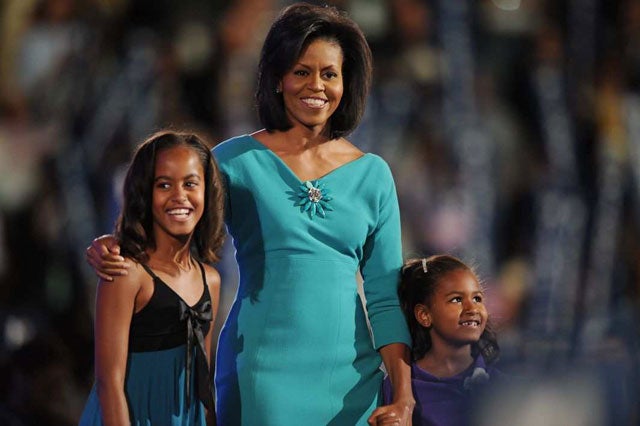Michelle takes on her critics and electrifies Denver

Your support helps us to tell the story
From reproductive rights to climate change to Big Tech, The Independent is on the ground when the story is developing. Whether it's investigating the financials of Elon Musk's pro-Trump PAC or producing our latest documentary, 'The A Word', which shines a light on the American women fighting for reproductive rights, we know how important it is to parse out the facts from the messaging.
At such a critical moment in US history, we need reporters on the ground. Your donation allows us to keep sending journalists to speak to both sides of the story.
The Independent is trusted by Americans across the entire political spectrum. And unlike many other quality news outlets, we choose not to lock Americans out of our reporting and analysis with paywalls. We believe quality journalism should be available to everyone, paid for by those who can afford it.
Your support makes all the difference.She done good. It was hard to say otherwise as Michelle Obama concluded her headline speech at the Denver convention. Never mind the family-values pantomime that followed with her two girls on stage and grinning husband Barack on the big screen above via satellite from Missouri.
"I am so lucky to be married to the woman who delivered that speech last night," Barack Obama said in an email to supporters. "Michelle was electrifying" – better perhaps than he was, he added, at the last Democratic convention in 2004.
Her task here had been amply flagged in advance and we could have been excused for tuning out – on the grounds that we knew what was coming. But she was far too arresting for that.
First, she needed to assuage doubts voters have about her, notably about her patriotism – or lack of it – dating back to mostly misinterpreted comments in February about being "really proud" of America for the first time because of Barack's success in the primaries. The required phrase came two-thirds of the way into the speech – "That is why I love this country" – just after the moment her speech reached its emotional climax.
"All of us driven by a simple belief that the world as it is just won't do; that we have an obligation to fight for the world as it should be," she said.
"That is the thread that connects our hearts. That is the thread that runs through my journey and Barack's journey and so many other improbable journeys that have brought us here tonight, where the current of history meets this new tide of hope."
But above all her task was to paint her man as the all-American guy whose background is not so different from hers and from those of millions whose support he needs this year. It is not that easy, of course, because it includes asking voters to buy into his post-racial vision of himself and the country.
She took the hammer to the message and never stopped pounding. "What struck me when I first met Barack was that, even though he had this funny name, even though he'd grown up all the way across the continent in Hawaii, his family was so much like mine." And he had been raised by grandparents who were "working-class folks" and, "a single mother who struggled to pay the bills just like we did".
She was good when she first came out but her confidence at the microphone seemed only to grow as she went on, straying occasionally from the script to work the audience a little bit more, or linger a bit longer on one phrase or syllable, for example when she touched on Iraq and the "military families who say grace each night with an empty seat at the table".
For a wife of a would-be leader to give so accomplished a speech might be hard to imagine in most other cultures. But in America, there is no embarrassment in public promotion of oneself or of the people you love. Stuttering and self-deprecation are given little place and the borderline between the genuine and the cheesy is so much further removed.
Yet, it is possible Mrs Obama went too far in a different respect. If many Americans – fighting remnants not just of racism but also of sexism – are still not quite comfortable with a spouse who might be as motivated as the candidate himself, she may have done too good.
"She was great," said Walter Isaacson, the CEO of the Aspen Institute and a former chief of Time magazine, "but I would say by about 10 per cent too much."
For rolling comment on the US election visit: independent.co.uk/campaign08
Join our commenting forum
Join thought-provoking conversations, follow other Independent readers and see their replies
Comments